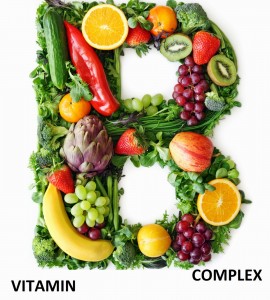Vitamin B is a water-soluble vitamin. They dissolve in water and are not stored in the body. Excess amounts are eliminated in urine so must be replaced every day in our diet to provide a continuous supply.These vitamins helps the body to get energy from the food we eat and helps in appetite control, vision, healthy skin, healthy nervous system and in red blood cell formation.B-complex vitamins are not harmful as the body excretes excess levels in urine. Read to know about Vitamins B8 Compounds.
B-complex is a compound of eight B vitamins,which includes
Table of Contents
1.Vitamin B1
(thiamine) is needed for carbohydrate metabolism(required to properly use carbohydrates), to release energy from food and helps in the functioning of heart, brain, cardiovascular and nervous system.It is also used for maintaining a positive mental attitude,enhancing learning abilities,fighting stress,preventing memory loss and Alzheimer’s disease.Healthcare providers give thiamine shots for a memory disorder, alcohol withdrawal and coma.
Vitamin B1 cures and prevents Beriberi. Sources of thiamine includes pork, legumes (dried beans), peanuts, sunflower seeds, whole grains and enriched breads and cereals.
2.Vitamin B2
(riboflavin) helps the cells use oxygen and promote tissue repair. It is important for body growth and red blood cell production and helps in releasing energy from carbohydrates.Sources of Riboflavin includes dairy products,eggs,green leafy vegetables,lean meats,legumes,milk,nuts,breads and cereals.They are often fortified with riboflavin. Fortified means the vitamin has been added to the food.Because riboflavin is destroyed by exposure to light, foods with riboflavin should not be stored in glass containers that are exposed to light.
Deficiency of riboflavin causes anemia,mouth or lip sores,skin disorders,sore throat,swelling of mucus membranes.Because riboflavin is a water-soluble vitamin, leftover amounts leave the body through the urine. There is no known poisoning from riboflavin.
3.Vitamin B3
(niacin and niacinamide ) is used to release energy from carbohydrate and to process alcohol.It comes in 2 basic forms, niacin and niacinamide.
Niacin regulates cholestorol and used for treatments which includes circulation problems, migraine headache, dizziness, and to reduce the diarrhea associated with cholera. Niacin is also used for preventing positive urine drug screens in people who take illegal drugs.
Niacinamide is used for treating diabetes.It is applied to the skin for treating a skin condition called inflammatory acne vulgaris.
Sources: yeast, meat, fish, milk, eggs, green vegetables, beans, and cereal grains.Deficiency causes pellegra,characterized by dermatitis (inflammation of the skin), diarrhea,Irritability,loss of appetite,weakness and dizziness.Excessive Intake may cause damage to liver and ulcer.
4.Vitamin B5
(pantothenic acid)sources includes liver, yeast, eggs, legumes (dried beans), milk and whole grain breads and cereals.It aids in carbohydrate, protein and fat metabolism,Synthesizes hormones and cholesterol.Deficiency of Vitamin B5 includes infertility,fatigue and irritability.Excessive Intake may result in diarrhea and water retention.
5.Vitamin B6
(pyridoxine, pyridoxal, or pyridoxamine, or pyridoxine hydrochloride) is needed for fat, carbohydrate, and protein metabolism.Make antibodies and helps to fight against diseases.It creates hemoglobin and keeps blood sugar (glucose) in normal ranges. It helps the body use amino acids,aids in normal brain function and for formation of red blood cells.Sources includes meat, poultry, fish, whole grain and enriched breads and cereals, legumes (dried beans), potatoes and bananas.Deficiency causes anemia,dermatitis (inflammation of the skin).Excessive Intake causes numbness and damage to the nervous system.
6.Vitamin B7
(biotin)sources includes yeast, organ meats, milk, egg yolks, nuts, legumes (dried beans), and whole grains.Aids in carbohydrate, protein and fat metabolism.Deficiency causes lack or loss of appetite, nausea and vomiting,inflammation of the tongue,dermatitis (dryness and inflammation of the skin) and depression.
7.Vitamin B9
(folic acid)sources includes leafy green vegetables, fruits, dried beans, peas and nuts. Enriched breads, cereals and other grain products also contain folic acid.
 Pregnant women who are thinking of becoming pregnant or who are pregnant often require additional supplementation of folic acid. Adequate folic acid is important for pregnant women because it has been shown to prevent some kinds of birth defects, including neural tube defects such as spina bifida. Many foods are now fortified with folic acid to help prevent these kinds of serious birth defects.
Pregnant women who are thinking of becoming pregnant or who are pregnant often require additional supplementation of folic acid. Adequate folic acid is important for pregnant women because it has been shown to prevent some kinds of birth defects, including neural tube defects such as spina bifida. Many foods are now fortified with folic acid to help prevent these kinds of serious birth defects.
Folate (folic acid)
It is necessary for the production of red blood cells and for the synthesis of DNA (which controls heredity and is used to guide the cell in its daily activities). Folic acid also helps with tissue growth and cell function. In addition, it helps to increase appetite when needed and stimulates the formation of digestive acids.
Deficiency causes depression and anemia.
8.Vitamin B12
(various cobalamins; commonly cyanocobalamin in vitamin supplements)found in meat, poultry, fish, milk, eggs, and cheese.It is used for memory loss, Alzheimer’s disease,boosting mood, energy, concentration,strengths immune system and slows down the aging process. It is also used for heart disease, lowering high homocysteine levels (which may contribute to heart disease), male infertility, diabetes, sleep disorders, depression, mental disorders, weak bones (osteoporosis), swollen tendons, AIDS, inflammatory bowel disease, asthma, allergies, a skin disease called vitiligo, preventing cervical and other cancers, and skin infections. Deficiency causes sore tongue,weakness and anemia.

